Changeable cloud and rising wind today, with just the odd drop of drizzle. Temperatures were highest in the night, slowly dropping from an overnight high of 10C to about 7C at the moment. As it's cloudy, we're missing out on the aurora. Being at latitude 58 north would mean a spectacular display. Well, it's raining as I type this, no tough luck.
Completed the first batch of additional research on WW1 casualties from the town of Stornoway, their number exceeding 140 - i.e. about 10% of the total number of those lost in the Great War. I have revised the Stornoway page of the memorial site Faces from the Lewis War Memorial. All the information on one person is now contained on the one page. Sometimes it is very little; sometimes there is rather more. The outlying districts are next.
An MP who went bananas in a bar in the Houses of Parliament on 22 February has been sentenced to a fine of £3,000 plus £1,400 in compensation to his victims; two fellow MPs and two researchers. He was also banned from all pubs and bars for several months. I would have expected Eric Joyce to have stepped down as MP for Falkirk (central Scotland) after such a disgraceful performance. But it is probably not politically expedient to have a by-election.
The Convener of Western Isles Council is stepping down in May, after 28 years as councillor and 13 years as Convener. Mr Macdonald finished by making a swipe against internet bloggers, whom he referred to as scurrilous and cowardly as well as not belonging to our community. Freedom of speech, anyone?
View across the Outer Harbour of Stornoway
Friday, 9 March 2012
Independence
The Scottish National Party, which is in government in Scotland at the moment, has proposed to hold a referendum on Scottish independence in the autumn of 2014. I have previously made my views on independence - I'm against.
Scotland was an independent nation until 1703, when it amalgamated with England, Wales and Ireland into the United Kingdom of Great Britain and Ireland (latterly Northern Ireland). Uprisings in 1715 and 1746 were organised to resurrect the monarchy in Scotland, led by the house of Stewart. Both failed abysmally, and the Battle of Culloden in April 1746 was the last to be fought on British soil. There is ill feeling in certain quarters between the English and the Scottish, and there is no denying the historical facts that underpin that. During the latter half of the 18th century, atrocities were committed in the Highlands to suppress any further uprisings. The clearances of the 19th century were, however, not solely committed by English landowners - a lot of them were carried out at the behest of Scottish landowners, living it up down in London.
Independence for Scotland is a serious matter. Independence is a serious matter for any nation, seeking to break away. If the referendum returns a definite 'yes' in favour, mechanisms should be in place to smooth over the transition. And that is where I start to get seriously criticial.
The SNP have been in power at Holyrood since May 2007. In those 5 years, they do not appear to have given much thought to the practicalities of running a country. To what needs to be done in order to effect the separation from England. The same accusation must be leveled at the Westminster government, which has failed to plan for the contingency of independence for Scotland. Each and every day, the papers here in Scotland are full of examples of things that have not been thought about. The nuclear submarine base at Faslane. The oil revenues. Taxation. Border controls. Security. Neither side have given it any thought.
I am not having a jibe specifically against any party. Labour was in power in Westminster in 2007; the Conservative / Liberal Democrat coalition has been in since 2010. So everybody has had their eye off the ball. The SNP is more concerned with England bashing than seriously preparing the country for a possible separation from England. Worse than that, England will most likely be their main trading partner following independence, so being confrontational is about the worst thing they could do.
Labour can be accused of complacency, and in disenfranchising 110,000 Scottish voters in the 2007 Scottish Parliament elections. The Conservatives can be bothered even less, as they have the grand total of one MP in Scotland.
Anyway, we're stuck with the present mess, and I dread for the future.
Scotland was an independent nation until 1703, when it amalgamated with England, Wales and Ireland into the United Kingdom of Great Britain and Ireland (latterly Northern Ireland). Uprisings in 1715 and 1746 were organised to resurrect the monarchy in Scotland, led by the house of Stewart. Both failed abysmally, and the Battle of Culloden in April 1746 was the last to be fought on British soil. There is ill feeling in certain quarters between the English and the Scottish, and there is no denying the historical facts that underpin that. During the latter half of the 18th century, atrocities were committed in the Highlands to suppress any further uprisings. The clearances of the 19th century were, however, not solely committed by English landowners - a lot of them were carried out at the behest of Scottish landowners, living it up down in London.
Independence for Scotland is a serious matter. Independence is a serious matter for any nation, seeking to break away. If the referendum returns a definite 'yes' in favour, mechanisms should be in place to smooth over the transition. And that is where I start to get seriously criticial.
The SNP have been in power at Holyrood since May 2007. In those 5 years, they do not appear to have given much thought to the practicalities of running a country. To what needs to be done in order to effect the separation from England. The same accusation must be leveled at the Westminster government, which has failed to plan for the contingency of independence for Scotland. Each and every day, the papers here in Scotland are full of examples of things that have not been thought about. The nuclear submarine base at Faslane. The oil revenues. Taxation. Border controls. Security. Neither side have given it any thought.
I am not having a jibe specifically against any party. Labour was in power in Westminster in 2007; the Conservative / Liberal Democrat coalition has been in since 2010. So everybody has had their eye off the ball. The SNP is more concerned with England bashing than seriously preparing the country for a possible separation from England. Worse than that, England will most likely be their main trading partner following independence, so being confrontational is about the worst thing they could do.
Labour can be accused of complacency, and in disenfranchising 110,000 Scottish voters in the 2007 Scottish Parliament elections. The Conservatives can be bothered even less, as they have the grand total of one MP in Scotland.
Anyway, we're stuck with the present mess, and I dread for the future.
Thursday, 8 March 2012
Thursday 8 March
Another of those eminently forgettable days in terms of weather. Grey, overcast and very windy. The ferry is stormbound in Ullapool overnight, the freight ferry is once again not running tonight - because we are on warning for a force 9. Not complaining though, I find the Hebrides' changeable weather one of its many redeeming features.
I have completed one more section of transcriptions of the Napier Report from 1883, this time for the county of Inverness. The commission of six sat at Glenelg, Arisaig, Inverness and Kingussie. The next section incorporates the hearings in Argyll - Tiree, Mull, Lismore, Morvern and Tarbert, Loch Fyne. After Argyll, only the hearings at Edinburgh and Lanark remain for me to transcribe. The Napier Commission posed some 47,000 questions, resulting in a report of about 4,000 pages. It is a keystone of Highlands and Islands history, which (through these internet transcriptions) I hope to make more easily accessible and searchable for other researchers.
I was saddened to hear of the death of the six British soldiers in Afghanistan. Each life lost is one too many. However, as an ex-army man myself (although never seen active service), I am only too aware that death is a major occupational hazard of soldiering. I think those guys knew it, having seen nearly 400 go ahead of them in Afghanistan. Their friends and family knew it too, and I was heartened by one relative who said that the mission in Afghanistan had to go on, on to success. Else all the blood, sweat and sacrifice would have been in vain.
I was disgusted to hear that our local council has rubberstamped the construction of another bl**dy windfarm on the outskirts of Stornoway. It is the substitute to the scheme that got thrown out in 2008, which would have seen 180 turbines, each standing 450 feet tall, marching over the Lewis moor from Stornoway north to Port of Ness. The forty turbines that have now been proposed will be in a smaller area, around the Barvas Hills, 4 miles north of Stornoway. These two images show the terrain on the Hills, and the view north. You can't get more desolate than that. And have turbines all around them? No way.
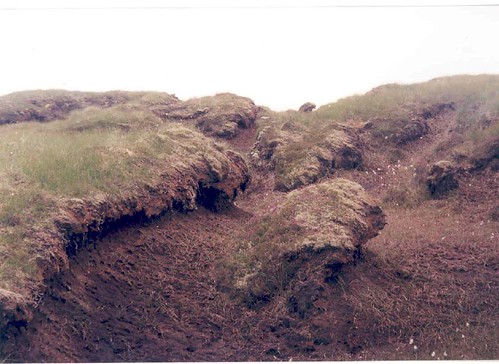
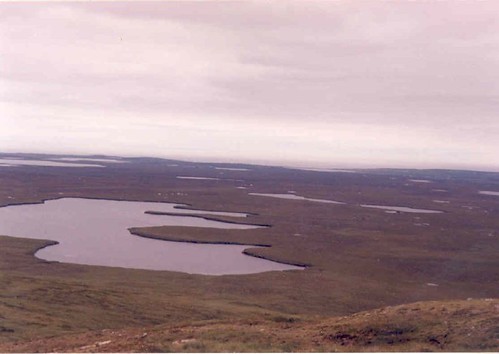
I have completed one more section of transcriptions of the Napier Report from 1883, this time for the county of Inverness. The commission of six sat at Glenelg, Arisaig, Inverness and Kingussie. The next section incorporates the hearings in Argyll - Tiree, Mull, Lismore, Morvern and Tarbert, Loch Fyne. After Argyll, only the hearings at Edinburgh and Lanark remain for me to transcribe. The Napier Commission posed some 47,000 questions, resulting in a report of about 4,000 pages. It is a keystone of Highlands and Islands history, which (through these internet transcriptions) I hope to make more easily accessible and searchable for other researchers.
I was saddened to hear of the death of the six British soldiers in Afghanistan. Each life lost is one too many. However, as an ex-army man myself (although never seen active service), I am only too aware that death is a major occupational hazard of soldiering. I think those guys knew it, having seen nearly 400 go ahead of them in Afghanistan. Their friends and family knew it too, and I was heartened by one relative who said that the mission in Afghanistan had to go on, on to success. Else all the blood, sweat and sacrifice would have been in vain.
I was disgusted to hear that our local council has rubberstamped the construction of another bl**dy windfarm on the outskirts of Stornoway. It is the substitute to the scheme that got thrown out in 2008, which would have seen 180 turbines, each standing 450 feet tall, marching over the Lewis moor from Stornoway north to Port of Ness. The forty turbines that have now been proposed will be in a smaller area, around the Barvas Hills, 4 miles north of Stornoway. These two images show the terrain on the Hills, and the view north. You can't get more desolate than that. And have turbines all around them? No way.


Wednesday, 7 March 2012
Wednesday 7 March
A day of sharp March showers, with rain, hail, sleet, snow and the kitchen-sink. It is feeling quite cold when the sun goes in. The wind has died down a little from yesterday's severe gale, but it remains very breezy.
A man was reported missing on Benbecula, some 70 miles south of here, after last being seen at Creagorry on Monday night. The body of the janitor at Lionacleit School was found in the waters of the South Ford earlier today. He was known to go out winkle picking at low tide.
Until the 1960s, crossing from Benbecula to South Uist was done by crossing through the waters and over tidal sand banks in the South Ford, a treacherous piece of water. The sands shift over time, and it was easy to be caught out. I stress that I make this remark in a historical and geographical perspective, and has no bearing on the incident involving the janitor. Lionacleit School is a large school, serving the islands of the Uists (North and South Uist, Berneray, Benbecula, Grimsay and Eriskay).
Talking of schools, the new primary school at Barvas, 11 miles north of Stornoway, has now been completed, on schedule and on budget. It is one of six new schools being built in the Western Isles, which include the new Nicolson Institute here in Stornoway. Pupils will start taking lessons in all 6 new buildings as of August this year.
A man was reported missing on Benbecula, some 70 miles south of here, after last being seen at Creagorry on Monday night. The body of the janitor at Lionacleit School was found in the waters of the South Ford earlier today. He was known to go out winkle picking at low tide.
Until the 1960s, crossing from Benbecula to South Uist was done by crossing through the waters and over tidal sand banks in the South Ford, a treacherous piece of water. The sands shift over time, and it was easy to be caught out. I stress that I make this remark in a historical and geographical perspective, and has no bearing on the incident involving the janitor. Lionacleit School is a large school, serving the islands of the Uists (North and South Uist, Berneray, Benbecula, Grimsay and Eriskay).
Talking of schools, the new primary school at Barvas, 11 miles north of Stornoway, has now been completed, on schedule and on budget. It is one of six new schools being built in the Western Isles, which include the new Nicolson Institute here in Stornoway. Pupils will start taking lessons in all 6 new buildings as of August this year.
Tuesday, 6 March 2012
Tuesday 6 March
A filthy day, with rain and a gale all day. Our ferry, the MV Isle of Lewis, has not had a good day at all. Halfway across the Minch, a crossing of 2 hours 45 minutes, one of its main engines cut out. The master decided to press on for the mainland port of Ullapool, which was reached 1½ hours late. The boat had to stay alongside pending repairs, as maritime regulations forbid her sailing on just the one engine. The baffling part of this story is that the Isle of Lewis has only just come out of dry-dock following her annual refit. Last night, the freight ferry Muirneag was not running either, on account of this bad weather, which sprang up overnight. The Isle of Lewis is due back on the run as of the 10.25 sailing from Ullapool back to Stornoway. It will not be a nice crossing, as the wind will only drop a notch, from force 8 to force 7.
Collected my new spectacles and sit here getting used to them. Reading is a lot easier, but the distortion is something I'll have to get used to over the next few days.
Collected my new spectacles and sit here getting used to them. Reading is a lot easier, but the distortion is something I'll have to get used to over the next few days.
Monday, 5 March 2012
Picture post - 5 March
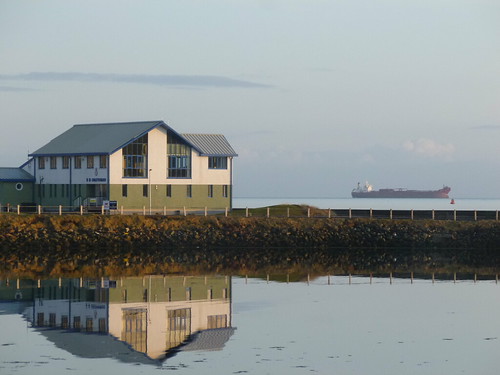
Stornoway Coastguard Station on a windless afternoon, with the tanker Grena in the background.

Francis Street, Stornoway
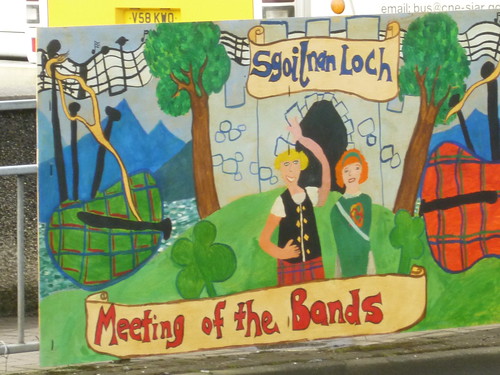
Meeting of the Bands
Monday 5 March
Another bright and sunny, if slightly nippy, day here in the Outer Hebrides. For the time being the last nice day, as we are on warning for high winds overnight. The freight ferry Muirneag has been cancelled - it usually departs Stornoway at 11.30pm, to return at 8 am the following morning. In other words, the shop is going to be empty tomorrow.
It has transpired that the Scottish Government is intending to slash parts of the Air Discount Scheme, ostensibly on account of demands from the European Union, but more likely to cut costs - of £2.7m per annum. Under ADS, islanders could purchase airtickets to a mainland hub at a discount of 40%. Bearing in mind that your average return from Stornoway to Glasgow costs about £160, ADS would take a useful £60 off. Our airfares are quite high at the best of times, and what with the cessation of reduced ferry fares for commercial vehicles, the economy of these islands is being adversely affected.
It has transpired that the Scottish Government is intending to slash parts of the Air Discount Scheme, ostensibly on account of demands from the European Union, but more likely to cut costs - of £2.7m per annum. Under ADS, islanders could purchase airtickets to a mainland hub at a discount of 40%. Bearing in mind that your average return from Stornoway to Glasgow costs about £160, ADS would take a useful £60 off. Our airfares are quite high at the best of times, and what with the cessation of reduced ferry fares for commercial vehicles, the economy of these islands is being adversely affected.
Sunday, 4 March 2012
Sunday 4 March
A bright and sunny day, but with isolated showers. Some of them of a wintry nature at higher elevations, as shown in this picture from North Harris. It has turned noticeably colder, as I found out when I went out for an amble in the afternoon.
To my delight, I found that my regular short walk round the powerstation has reopened following months of closure due to soil cleaning work. Four years ago, several fuel storage tanks were removed outside the powerstation, and the fuel had leaked into the ground. This necessitated a huge clear-up, which continues today.
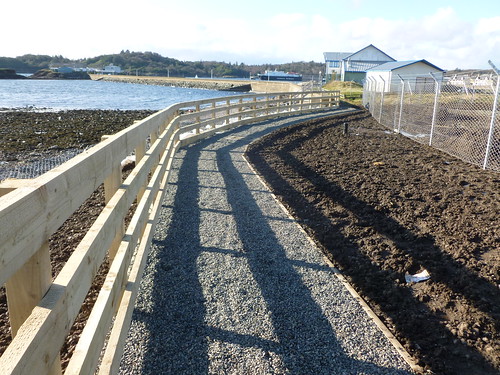
The walk takes me round to the Battery.
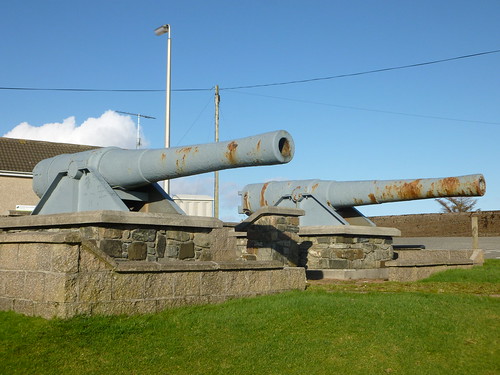
And yes, those are two ships' cannon. They mark the spot where the Royal Naval Reserve had a base during WW1, and it was near there that the bodies of the sailors who drowned in the Iolaire Disaster of 1 January 1919 were brought ashore. The total number of casualties was 205, but 60 of those lost were never found.
I continued to look at details of several Stornoway men who were lost during WW1 - you can follow progress here. I have researched 124 (not claiming to be supplying complete information by a long shot), and still have about 1170 to go. I completed the transcription of evidence given to the Napier Commission at Inverness, From the county of Inverness, I have the evidence from Kingussie left to transcribe. Otherwise, there is the sessions in Argyll, Lanark and Edinburgh. And I have also continued to transcribe the evidence from the Dewar Report at Stornoway. I copy interesting bits onto my local history blog Pentland Road. The Dewar Report was published 100 years ago this year and led to a revolution in healthcare in Scotland.
To my delight, I found that my regular short walk round the powerstation has reopened following months of closure due to soil cleaning work. Four years ago, several fuel storage tanks were removed outside the powerstation, and the fuel had leaked into the ground. This necessitated a huge clear-up, which continues today.

The walk takes me round to the Battery.

And yes, those are two ships' cannon. They mark the spot where the Royal Naval Reserve had a base during WW1, and it was near there that the bodies of the sailors who drowned in the Iolaire Disaster of 1 January 1919 were brought ashore. The total number of casualties was 205, but 60 of those lost were never found.
I continued to look at details of several Stornoway men who were lost during WW1 - you can follow progress here. I have researched 124 (not claiming to be supplying complete information by a long shot), and still have about 1170 to go. I completed the transcription of evidence given to the Napier Commission at Inverness, From the county of Inverness, I have the evidence from Kingussie left to transcribe. Otherwise, there is the sessions in Argyll, Lanark and Edinburgh. And I have also continued to transcribe the evidence from the Dewar Report at Stornoway. I copy interesting bits onto my local history blog Pentland Road. The Dewar Report was published 100 years ago this year and led to a revolution in healthcare in Scotland.
Saturday 3 March
Quite a bright day to start with, but clouds rolled in after lunch, and we were treated to a few heavy downpours. Spent the afternoon transcribing a large segment of the Napier Report of 1883, closing the evidence that was taken at Inverness. This, to a large extent, related to evidence from other parts of the Highlands. The witnesses consisted mainly of factors and other representatives of landowners, but with a widely varying take on the problems facing crofters and cottars in the north of Scotland. I have yet to copy the transcripts from Inverness onto the website.
Friday, 2 March 2012
Friday 2 March
Quite a mild day with good long spells of sunshine. We managed an unexpected 13C, but we'll have to wait a while to temperatures like that again. A cold spell is headed our way from the Atlantic.
I have continued to transcribe the Report from the Napier Commission, which had been hearing some very lengthy evidence during its session at Inverness in October 1883. The question was all about deer forests. Now, what is a deer forest? Forget about trees. They tend to be depopulated areas of land, whether depopulated through compulsion or through inhospitable terrain, where deer roam free. The deer are there to be shot, for sport, by gamesmen who rent a day's shooting from the relevant estate. During the 19th century, hundreds of villages and thousands of people were cleared from land, in order to make way for deer forests, sheep farms or other means of making more money for the landowners. Bear in mind though that the landowners were required to support their tenants at times of need, like supply food. In 1846, e.g., the potato harvest failed, giving rise to famine in many areas of the British Isles, such as Ireland and Scotland. Earlier that century, people had been forced to emigrate, even though there was no real need for them to do so.
The resentment, created by this less salubrious episode in Scottish history, still runs to the surface today. Some believe that Scottish independence is the way forward. However, many forget that it was Scottish lairds that were responsible for some of the clearances.
I have continued to transcribe the Report from the Napier Commission, which had been hearing some very lengthy evidence during its session at Inverness in October 1883. The question was all about deer forests. Now, what is a deer forest? Forget about trees. They tend to be depopulated areas of land, whether depopulated through compulsion or through inhospitable terrain, where deer roam free. The deer are there to be shot, for sport, by gamesmen who rent a day's shooting from the relevant estate. During the 19th century, hundreds of villages and thousands of people were cleared from land, in order to make way for deer forests, sheep farms or other means of making more money for the landowners. Bear in mind though that the landowners were required to support their tenants at times of need, like supply food. In 1846, e.g., the potato harvest failed, giving rise to famine in many areas of the British Isles, such as Ireland and Scotland. Earlier that century, people had been forced to emigrate, even though there was no real need for them to do so.
The resentment, created by this less salubrious episode in Scottish history, still runs to the surface today. Some believe that Scottish independence is the way forward. However, many forget that it was Scottish lairds that were responsible for some of the clearances.
Thursday, 1 March 2012
Thursday 1 March
March has come in like a lamb, here in the Hebrides. A cloudy morning gave way to a sunny afternoon, although when cloud gradually increased, it began to feel colder, out of the sun.
The unfamiliar outline of the ferry MV Clansman loomed up at the ferry pier this morning. The boat is here until the weekend, when she will sail the 40 miles to Tarbert to take up the triangular service between Uig, Lochmaddy and Tarbert, whilst its regular vessel, the MV Hebrides goes off for refit. Checking AIS, I noticed the MV Hjaltland passing Cape Wrath, the far northwestern corner of the British mainland, on its way to Lerwick. The Hjaltland sails between Aberdeen, Orkney and Shetland, but has been in drydock at Birkenhead for the past couple of weeks. The people of the Northern Isles will be very happy to see her back, as they have been on a severely curtailed service for the past couple of weeks.
There is an on-going hullabaloo about fuel prices in these parts. The UK government introduced a price derogation of 5p per litre today, but it is alleged that fuel wholesalers have been edging up the prices by 5p over the past fortnight, so the net effect of this fuel derogation is zilch. A government minister has warned that profiteering will be dealt with, but knowing how the fuel business is tied in with certain councillors in these parts, I really do wonder if that will carry much clout.
I spent 45 minutes in the library, scanning 57 pages from the Dewar Report and uploading them to my Dropbox account. I shall unleash an on-line OCR (optical character recognition) programme to turn the scans into manageable text, for uploading to another of my blogs. Of which I now have 61.
The unfamiliar outline of the ferry MV Clansman loomed up at the ferry pier this morning. The boat is here until the weekend, when she will sail the 40 miles to Tarbert to take up the triangular service between Uig, Lochmaddy and Tarbert, whilst its regular vessel, the MV Hebrides goes off for refit. Checking AIS, I noticed the MV Hjaltland passing Cape Wrath, the far northwestern corner of the British mainland, on its way to Lerwick. The Hjaltland sails between Aberdeen, Orkney and Shetland, but has been in drydock at Birkenhead for the past couple of weeks. The people of the Northern Isles will be very happy to see her back, as they have been on a severely curtailed service for the past couple of weeks.
There is an on-going hullabaloo about fuel prices in these parts. The UK government introduced a price derogation of 5p per litre today, but it is alleged that fuel wholesalers have been edging up the prices by 5p over the past fortnight, so the net effect of this fuel derogation is zilch. A government minister has warned that profiteering will be dealt with, but knowing how the fuel business is tied in with certain councillors in these parts, I really do wonder if that will carry much clout.
I spent 45 minutes in the library, scanning 57 pages from the Dewar Report and uploading them to my Dropbox account. I shall unleash an on-line OCR (optical character recognition) programme to turn the scans into manageable text, for uploading to another of my blogs. Of which I now have 61.
Wednesday, 29 February 2012
Wednesday 29 February
It's :Leap Year Day today, and the babies born today will only be able to celebrate their birthday properly once every 4 years. It reminds me of the Gilbert & Sullivan operetta Pirates of Penzance, where the hero can leave his apprenticeship with the pirates on his 21st birthday. Only to find out it was February 29th, so he can't leave until he is 84.
It felt very cold today, as a strong wind blew over Stornoway. Quite a contrast to the summery scenes over in Aberdeen, particularly yesterday. Went into town for a few bits and bobs, but it felt bitterly cold in the southerly breeze. We are set for a colder spell as March comes in, but just a dip in temperatures, no return to winter imminent.
Quite a few schools in the Western Isles are closing this year, among them the ones at Sandwickhill and Bragar. A Facebook page, organised by Tasglann nan Eilean [Hebridean Archives] has been set up for each of the schools, and the one at Airidhantuim seems to be particularly popular. Wanna try pronouncing that last name? Unless you're a local person here in Lewis, you will never get it right.
It felt very cold today, as a strong wind blew over Stornoway. Quite a contrast to the summery scenes over in Aberdeen, particularly yesterday. Went into town for a few bits and bobs, but it felt bitterly cold in the southerly breeze. We are set for a colder spell as March comes in, but just a dip in temperatures, no return to winter imminent.
Quite a few schools in the Western Isles are closing this year, among them the ones at Sandwickhill and Bragar. A Facebook page, organised by Tasglann nan Eilean [Hebridean Archives] has been set up for each of the schools, and the one at Airidhantuim seems to be particularly popular. Wanna try pronouncing that last name? Unless you're a local person here in Lewis, you will never get it right.
Tuesday, 28 February 2012
Tuesday 28 February
An overcast day, but fairly mild. However, the mercury at Aberdeen crested 17C / 63F, which is 11 degrees above the long-term average. The high temperatures were caused by the föhn over the Cairngorms.
Ferry company Calmac have made a hash of their brochure for their services. On a map of the islands to the west of the mainland, several hotels and guesthouses have been pinpointed to the wrong location. And not just a little; a hotel in Barra has been placed in Skye, 50 miles to the east, and a guesthouse north of Stornoway is placed 50 miles away in Uig. They have apologised for the error.
I spent about 40 minutes in the library scanning pages from the Dewar Report of 1912, which reviewed the provision of medical services in the Highlands and Islands of Scotland at the start of the 20th century. As I outlined last week, this report led to the establishment of the Medical Service for the Highlands and Islands, and ultimately the NHS in 1948. Some of those pages I have forwarded to my friend and fellow researcher Direcleit, who covers Harris, Berneray and adjacent areas of North Uist.
Ferry company Calmac have made a hash of their brochure for their services. On a map of the islands to the west of the mainland, several hotels and guesthouses have been pinpointed to the wrong location. And not just a little; a hotel in Barra has been placed in Skye, 50 miles to the east, and a guesthouse north of Stornoway is placed 50 miles away in Uig. They have apologised for the error.
I spent about 40 minutes in the library scanning pages from the Dewar Report of 1912, which reviewed the provision of medical services in the Highlands and Islands of Scotland at the start of the 20th century. As I outlined last week, this report led to the establishment of the Medical Service for the Highlands and Islands, and ultimately the NHS in 1948. Some of those pages I have forwarded to my friend and fellow researcher Direcleit, who covers Harris, Berneray and adjacent areas of North Uist.
Monday, 27 February 2012
Monday 27 February
A very mild day, with the mercury easily reaching 12C under cloudy skies. It was also quite breezy, but nothing dramatic.
Went to the optician's for an eye-test and the selection of a new pair of spectacles. Should be ready within one or two weeks. The prescription will have to be faxed to a place on the mainland, which will produce the lenses. The optician's will then insert the lenses into the frame, and get in touch with me to come and collect them. Like everybody else, I'm not getting any younger, so I'm joining the ranks of the varifocal brigade. A certain person, well-known to me, decided to wear their varifocals for the first time when going on a train journey. On alighting from the train, they misjudged the distance between carriage floor and station platform (2½ feet), so they ended up prostrate on the platform.
Our Post Office, on Francis Street, has had to shut unexpectedly due to security concerns. People with car tax applications have been panicking, because they faced a round trip of 50 miles to Ness or 75 miles to Tarbert to have their forms processed. Fortunately, Royal Mail have seen sense and deployed their staff to the sub-postoffice on Bayhead.
Went to the optician's for an eye-test and the selection of a new pair of spectacles. Should be ready within one or two weeks. The prescription will have to be faxed to a place on the mainland, which will produce the lenses. The optician's will then insert the lenses into the frame, and get in touch with me to come and collect them. Like everybody else, I'm not getting any younger, so I'm joining the ranks of the varifocal brigade. A certain person, well-known to me, decided to wear their varifocals for the first time when going on a train journey. On alighting from the train, they misjudged the distance between carriage floor and station platform (2½ feet), so they ended up prostrate on the platform.
Our Post Office, on Francis Street, has had to shut unexpectedly due to security concerns. People with car tax applications have been panicking, because they faced a round trip of 50 miles to Ness or 75 miles to Tarbert to have their forms processed. Fortunately, Royal Mail have seen sense and deployed their staff to the sub-postoffice on Bayhead.
Sunday, 26 February 2012
Sunday 26 February
Yesterday, it was reported that a pedestrian had been knocked down in the road between Carloway and Callanish. The man was taken to hospital in Stornoway, and has undergone an operation. Following an appeal in local media, the driver of the car, which had driven off following the incident, has come forward.
An overcast day, with plenty of wind and rain, although the wind appears to have subsided somewhat.
Kept another quiet day, watching an episode of Columbo in the afternoon. More tomorrow.
An overcast day, with plenty of wind and rain, although the wind appears to have subsided somewhat.
Kept another quiet day, watching an episode of Columbo in the afternoon. More tomorrow.
Saturday, 25 February 2012
Saturday 25 February
A pretty bright day with good periods of sunshine. We managed 10C / 50F, but the mercury is going down fast as I type, 9.20pm. Tomorrow will not be as good a day, as the Met Office is warning of rain and wind. What's new, it's the Hebrides.
Have completed the second set of transcriptions of the Napier Commission's report from Inverness, dated October 1883. This document is pivotal in the history of the Highlands and Islands, and amongst today's gem was an exercise in polite jibing between the commissioners and a less than pleasant witness. The subject was the clearance of Strathnaver, in the far north of Scotland, which the witness played down.
Otherwise, I kept a quiet day on account of a very disturbed night.
Have completed the second set of transcriptions of the Napier Commission's report from Inverness, dated October 1883. This document is pivotal in the history of the Highlands and Islands, and amongst today's gem was an exercise in polite jibing between the commissioners and a less than pleasant witness. The subject was the clearance of Strathnaver, in the far north of Scotland, which the witness played down.
Otherwise, I kept a quiet day on account of a very disturbed night.
Friday, 24 February 2012
Ferry woes
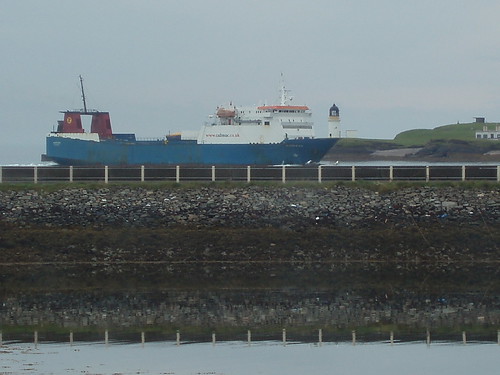
After the problems surrounding the ferry Isle of Lewis, which decided to dispute passage with the town of Birkenhead, the lifeline service between Stornoway and Ullapool has gone back to normal. Fellow blogger Tony has highlighted the issues surrounding the freight ferry Muirneag, which was out of action this week either because of bad weather (what bad weather?) or on account of its steering gear being faulty. The Muirneag carries our freight, varying from roofbeams to cans of catfood. However, she is an old lady of the seas, starting life in 1979 and plying various routes in northern Europe before coming to Stornoway in 2002. Muirneag will be scrapped in 2013.
The reason for the cancelled sailings are two-fold. First of all, her manoeuverability is poor, and the fact that she carries light loads means she is high out of the water, making her susceptible to high winds. The second reason goes back just over 6 years, to events on 11 November 2005. Muirneag ventured out to sea, hoping to beat the forecast storm. Unfortunately, the Met Office was late issuing its storm warning, meaning that she was forced to go with the force 12 winds and ended up 60 miles north of the Butt of Lewis, well on her way to the Faeroes. Since that hairy episode, Calmac have been justifiably cautious with her sailings. And I'd rather have Muirneag stuck in port than stuck on the bottom of the Minch.
Muirneag is named after this hill in the north of the island, 4 miles west of North Tolsta.

Friday 24 February
A fairly bright and sunny day, but quite a bit cooler than yesterday. The mercury only just about reached 8C / 46F. The weather in the Southern Hemisphere tropics is calm, with no hurricanes worth mentioning. The two disturbances that the Joint Typhoon Warning Center has detected have little chance (less than 30%) of developing into anything serious.
Dutch prince Friso, second son of Queen Beatrix, is in coma and unlikely to ever waken up again. Last Friday he was buried under an avalanche for 20 minutes, after which he was resuscitated for 50 minutes. Doctors in Austria today revealed he had sustained massive brain damage. The mood in Holland has shifted from quiet hope to gloom. Several public engagements by Queen Beatrix have been cancelled. Prince Friso will be transferred to a neurological rehab unit elsewhere in due course.
I am continuing with my transcription of the Napier Report, a 4,000 page document relating the conditions under which crofters and cottars were living in the third quarter of the 19th century. Having reached evidence that was taken at Inverness in October 1883, I found contrasting witnesses. One decried the crofters in western Scotland as lazy and indolent; the very next witness listed the achievements of his fellow residents in a glen, some 20 miles west of Inverness. Several had become bishops, and quite a few had achieved high ranks in the Army.
In 2007, a statue was unveiled at Helmsdale, 40 miles north of Inverness. Strath Kildonan, just north of Helmsdale, was the scene of clearances in the early 19th century. The statue depicted a Highlander, boldly striding forth to a new life in the New World, ready to achieve great things. And many did so. My point is, however: why were they not allowed to achieve great things on their home soil?
Dutch prince Friso, second son of Queen Beatrix, is in coma and unlikely to ever waken up again. Last Friday he was buried under an avalanche for 20 minutes, after which he was resuscitated for 50 minutes. Doctors in Austria today revealed he had sustained massive brain damage. The mood in Holland has shifted from quiet hope to gloom. Several public engagements by Queen Beatrix have been cancelled. Prince Friso will be transferred to a neurological rehab unit elsewhere in due course.
I am continuing with my transcription of the Napier Report, a 4,000 page document relating the conditions under which crofters and cottars were living in the third quarter of the 19th century. Having reached evidence that was taken at Inverness in October 1883, I found contrasting witnesses. One decried the crofters in western Scotland as lazy and indolent; the very next witness listed the achievements of his fellow residents in a glen, some 20 miles west of Inverness. Several had become bishops, and quite a few had achieved high ranks in the Army.
In 2007, a statue was unveiled at Helmsdale, 40 miles north of Inverness. Strath Kildonan, just north of Helmsdale, was the scene of clearances in the early 19th century. The statue depicted a Highlander, boldly striding forth to a new life in the New World, ready to achieve great things. And many did so. My point is, however: why were they not allowed to achieve great things on their home soil?
Thursday, 23 February 2012
The Italian Chapel
It is 70 years ago today that the first Italian prisoners of war (POW) arrived on the Orkney island of Lamb Holm. They would spend the next two years reinforcing the Churchill Barriers, which protect the then naval base at Scapa Flow. In between, they also converted two old Nissen huts into a church. In addition to these picture slides on the BBC, I am posting some of my own pics, which I took during a visit in October 2008.
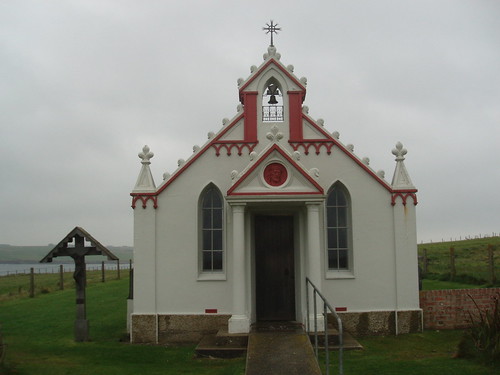
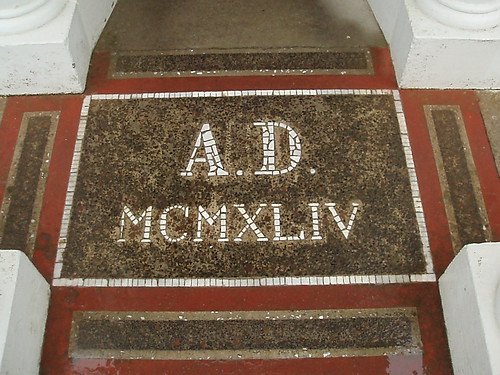
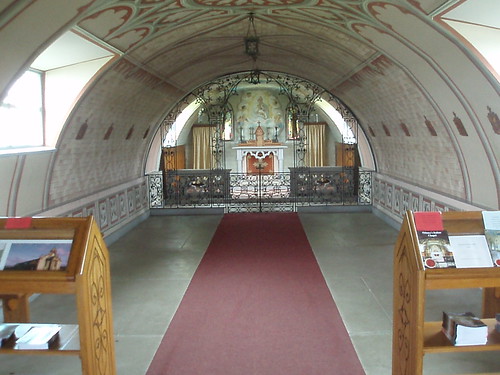
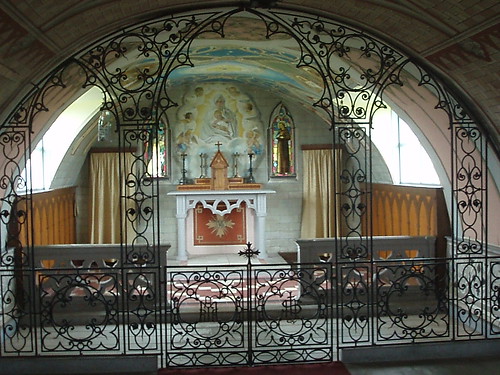
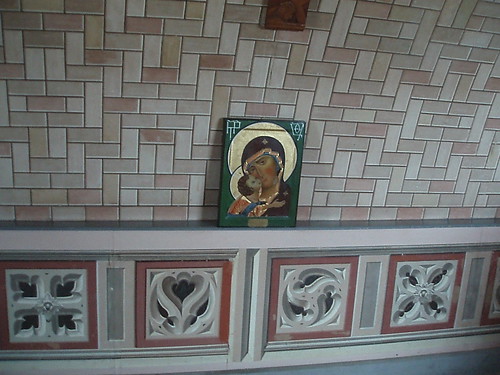

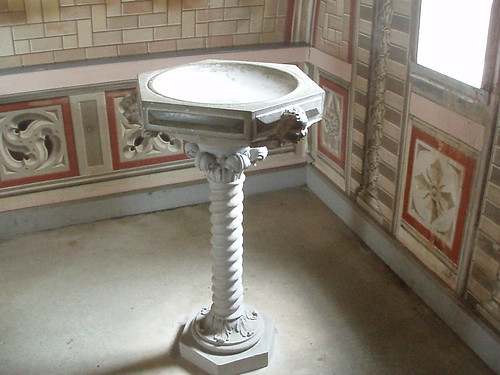







Thursday 23 February
After a slight mishap with my spectacles, I had to attend the optician's first thing this morning. Only to be told that repairs were not really possible. So, I'm going to have an eye test next week and hopefully a new pair of specs soon. I have made a temporary fix on the old ones, but it is a tad annoying.
Today's highest temperature in the UK has been 18.7C (65.7F) in Warwickshire, central England. Here in Stornoway, it has been slightly less warm at 13C / 55F. Still far above normal for the time of year. Everybody will revert back to normal by the weekend. The weather here has otherwise been rather damp and quite windy, with force 7 being the rule.
I have been asked about the condition of Prince Johan Friso of the Netherlands, who was severely injured in an avalanche in the Austrian Alps last Friday. He remains in coma, with apparently a body core temperature of around 34C / 93F, and no change in condition since the accident. Doctors will now not declare when they expect to make a prognosis. Johan Friso's mother, Queen Beatrix, and his wife Mabel are never far from his side; the Queen has even cancelled an engagement to accept papers of accreditation from new foreign ambassadors to The Hague.
Today's highest temperature in the UK has been 18.7C (65.7F) in Warwickshire, central England. Here in Stornoway, it has been slightly less warm at 13C / 55F. Still far above normal for the time of year. Everybody will revert back to normal by the weekend. The weather here has otherwise been rather damp and quite windy, with force 7 being the rule.
I have been asked about the condition of Prince Johan Friso of the Netherlands, who was severely injured in an avalanche in the Austrian Alps last Friday. He remains in coma, with apparently a body core temperature of around 34C / 93F, and no change in condition since the accident. Doctors will now not declare when they expect to make a prognosis. Johan Friso's mother, Queen Beatrix, and his wife Mabel are never far from his side; the Queen has even cancelled an engagement to accept papers of accreditation from new foreign ambassadors to The Hague.
Subscribe to:
Posts (Atom)